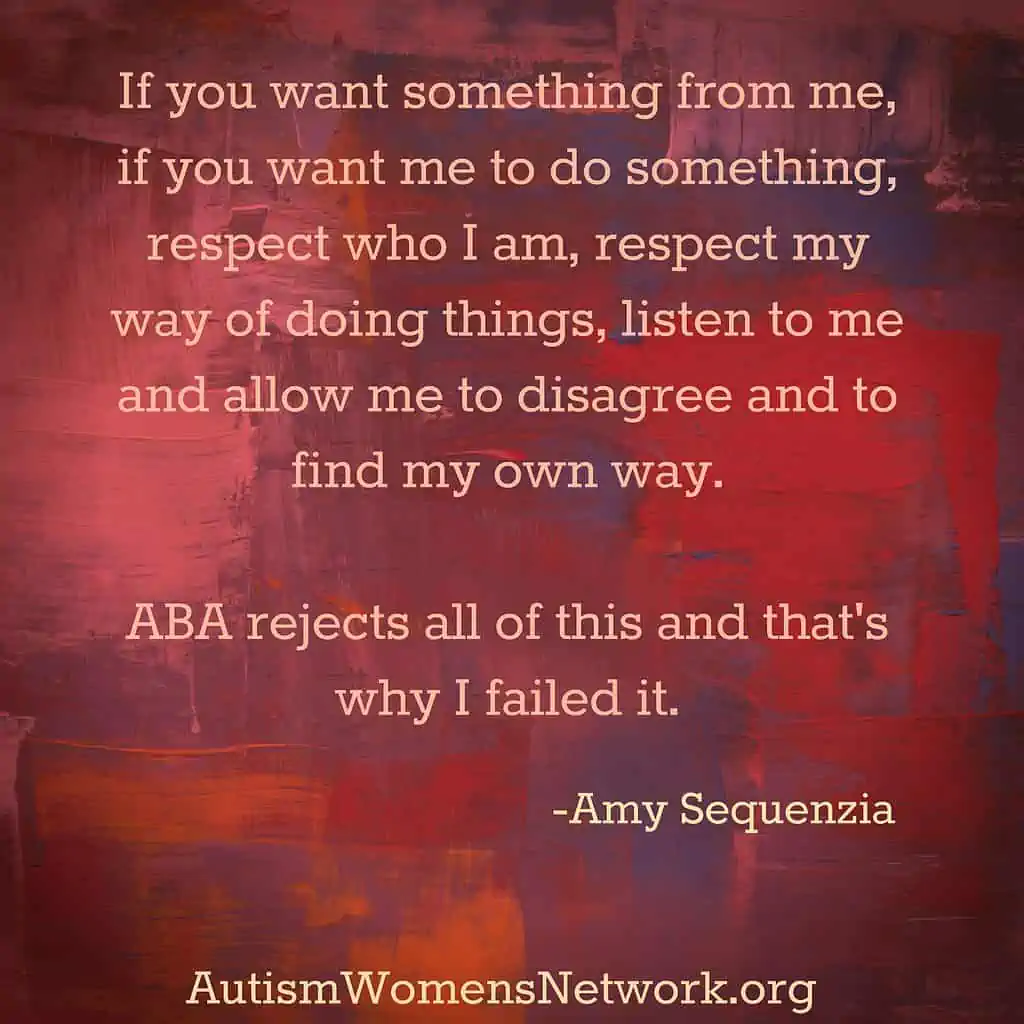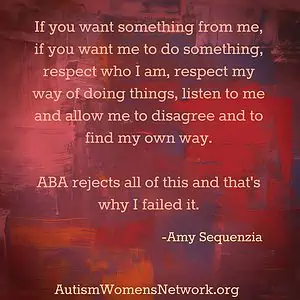
My Thoughts on ABA
So. Uh. Lovaas said this, in his 1981 book, The ME book. This is where Lovaas first spelled out ABA.
“With responsibility, the developmentally disabled individual takes on dignity and ‘acquires’ certain basic rights as a person. No one has the right to be taken care of, no matter how retarded he is. So, put your child to work; his work is to learn.”
So. There you have it. Y’all are demanding insurance pay for ‘therapy’ invented by a man who literally thinks we are not people until we perform to his specifications.
This is a Facebook status my friend Kassiane Alexandra S. posted, reminding us of the origins of Applied Behavior Analysis, or ABA.
Remember that Lovaas not only decided that Autistics were subhuman, he also tried abusive experiments on “a feminine young boy”, even though this boy stated, as an adult, that the “treatment” did not work.
Can you imagine people saying, today, that homosexuals should be abused until they became heterosexual, and such practices being openly advertised, mainstreamed, praised and covered by insurance?
That’s what ABA does to Autistics: it advertises a “treatment” to make us “better”, to “recover” us from the “tragedy” of being neurodivergent, and “experts” praise this as if it is not abuse, while parents fight for insurers to pay for such abuse.
Some people seem to think that when independent thinking Autistics – the ones who escaped the abuses of ABA, or the ones who can see behind the curtain of deceit – talk about how harmful this “treatment” is, that we are simply trying to make noise.
This is not true.
We speak up because we know that our identity and our humanity cannot be taken away, something people who don’t share our neurology seem to believe can happen. And they do try. They decided to follow the teachings of someone who said that we only have basic rights if we comply with the neuromajority.

Text reads: If you want something from me, if you want me to do something, respect who I am, respect my way of doing things, listen to me and allow me to disagree and to find my own way. ABA rejects all of this and that’s why I failed it. -Amy Sequenzia AutismWomensNetwork.org. Image description: The background is a compilation of brush strokes in various colors (red, orange, and blue)
Sadly, too many Autistics are not allowed to reclaim their rights. They are not allowed to say “no” to forced compliance.
They are the ones “excelling” in ABA.
Another point I want to make is about the financial cost of ABA. Sessions are expensive, and the so-called experts declare that an Autistic child must start ABA as soon as a diagnosis is given.
Some recommend up to 40 hours per week of this “therapy”, which consists of commands an Autistic child must follow to exhaustion, responses an Autistic child must give “correctly”, even if the answers don’t match the child’s feelings or preferences, and the repression of movements that Autistics use to regulate their own bodies.
Besides this extreme regimen, the “experts” insist that parents use the same tactics at home.
So, parents pay a lot of money to people who don’t allow Autistics to experience growth, and the world, the Autistic way. They pay for abuse.
Parents are made to feel guilty and encouraged to force their children into molds that were not made for them.
Autistic children are not allowed to be themselves, being forced instead, to learn how to pretend, never learning self-determination, never allowed to have an independent thought.
Not surprisingly, the majority of ABA proponents are making a lot of money by stealing the childhood of Autistic children. 40 hours/week of drills, plus homework, the children don’t experience their own personal development.
This is considered abuse, if done to non-autistics. And then we have to hear that WE cost too much money.
Wrong: ABA therapists cost too much money. Take them out of our lives, let Autistic children be children. Let Autistics develop in our own time, learning about ourselves, learning self-determination.
I can hear the apologists:
My ABA is not like that.
If you bill ABA prices, if you want to change how an Autistic acts, reacts, or interacts with the world, and your ideal model is a neurotypical type of behavior, your ABA is as bad as I described it.
My child loves it.
How would you know, if she is not allowed to have her own thoughts? The word “no”, or refusal to comply with the therapist’s commands, are not allowed.
Another reason is that children do learn to fake in order to please. That is, after all, what ABA defines as success: obedient pleasers. It is not enjoyment, pleasant or something to look forward to.
Yes, some children might show enjoyment in some moments, but I did too, when I got my cookie for looking at the therapist. I wanted that cookie, I briefly looked at her, I got my wish. You could say that, at that moment, I “loved it”.
It is not as bad as you think.
Yes it is. Putting children through unending hours of training, not allowing them to be who they are, forcing an experience of the world we Autistics can never naturally have, and stating how not good enough we are to everyone else is pretty bad. It is abusive. It is disrespectful.
Autistic children need to learn certain skills.
All children do. Respectful approaches don’t cause trauma and value our essence. It does not imply we are broken.
All children make mistakes and they have a chance to learn, they are kindly guided and taught. But to ABA proponents, Autistic children (and Autistic adults) are not allowed to err, or they are forever labeled a failure, or abused until they “get it right”.
I had some ABA when I was young, and I “flunked”. I want to say, I am proud of this “F” in my life.
Of course, the “experts” explanation for having failed to make me into a “tidy”, “appropriate”, “good girl”, obedient and compliant Autistic was my severe impairment, my extreme low IQ, my inability to learn or, as Lovaas would probably have said (and something a doctor actually said), my lack of human dignity.
I prefer my own assessment: if you want something from me, if you want me to do something, respect who I am, respect my way of doing things, listen to me and allow me to disagree and to find my own way.
ABA rejects all of this and that’s why I failed it.
I am, though, a very disabled Autistic who needs a lot of support, but who is completely independent in what I believe matters most: my thinking, my ideas, my decisions, my identity.
I am completely distinguishable from my peers, and proudly so.
I am free to say “no” when I see fit. And I do.

